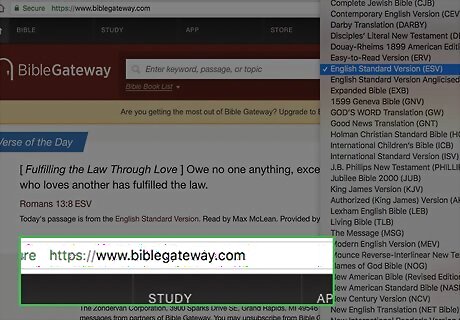
views
Steps

Follow, above all, the scriptures and the leading of the Holy Spirit for God's purpose in the lives of your congregation. Seek a heartfelt "anointing".

Get a clear idea of what you intend to teach. Study and pray to seek The Holy Spirit's guidance: be enthused. Usually the basis of the idea should be backed up with Bible scripture. You never will begin to preach without a direction or purpose, if you follow the steps to get it organized.

Plan and make an outline for your topic that is something you would like to know more about and can explain and teach to: that does not mean to create a story like literature, or a lecture and not even to write an essay, but you do need to plan it as explained in the Three Part Outline section. A lesson or sermon is usually best, if it is spoken without memorizing it all and not even writing it all down in complete sentences, and then you cannot merely read it, but use a meaningful outline. Make your key words larger so that they stand out in your eye and in your mind. That can be like a map to follow. A lesson or sermon should be better when it is not like a speech or oration that a public speaker (such as a politician) might simply read to an audience, unless you are an extremely effective reader. Each sermon may be a whole new topic or one in a "series" of multiple sermons or lessons.

Be dynamic, with a living phrasing by not merely reading it, so that it is not set in stone, and then you can feel more inspired and alive, and make a more inspiring communication between the teacher/preacher and the class or the congregation.

Try "not" relying on very detailed notes, but that does not mean that you will be speaking without your plan or without your outline. Know the outline and the plan so well that you don't need to look at it or your notes more than an occasional glance, or so that you only need the larger key word to make it click in your mind, but you can have them there, open and available.

Be direct; get to the point of the message that is intended, but how do you do it?

Think of a topic as having three simple parts in the message or lesson like a three part outline. That three part process is given next.
Three Part Outline

Introduce your message topic: tell what you are going to cover and why, or why it's important, or how it is relevant. You may give a humorous remark about what it does or does not mean. Use a starting point related to a scripture or an event that was/is the impetus for the main idea.

Teach the message by developing it (expanding upon it): give examples and tell who is involved?, when?, where?, how?, why? and alternatives, or what the different events might be. Since you gave the concept to be developed in the introduction, then you and the class or congregation know what you are talking about, and you know upon what you will make a conclusion. Develop your main points with examples like a story or two, Biblical parables, part of a song, church events or such that you can weave into the topic. You may realize that there would be objections in your topic like: "What do you mean?" "How did that happen?" "What if ______________ (name something) happened?" And so, ask those as "rhetorical" questions (not to seek an answer from the audience, unless it's a small group), and answer them like: "What if _________ (something) happened? Well, then ____________ (this) is what you or someone can do because ___________ (whatever), but then..." (fill in the blanks beforehand) -- and so you would answer the objections or questions for them. If you do allow answers, wait for it... as in a class room; don't disagree with the answer unless it is important to say why "Actually, I feel like this is the answer: _______" (giving your view). Generally, suspend judgment so you neither praise nor ignore comments, and you can nod and say one or a few words in response "I see.", while nodding agreeably, "Okay.", "I see your point." or "Thank you." or such a non-judgmental remark -- and then steer it onto the path it was supposed to be on (without characterizing the comment as right or wrong).

Conclude with issuing a call to action based on the matter in the topic. Perhaps this would be a call to accept Jesus as Savior. This is putting the finish on what you introduced and developed--such as to remember to try the ideas, pray, invite others, or study, etc. This is like an assignment to do the things that you taught or preached about.
Use some optional resources

Rely on other people for advice and all of your ideas: No, not really. It is a good idea to have someone to talk ideas over with, if you would not talk and visit all day with various people, and avoid not studying or preparing well -- that won't work very often.

Talk to other teachers/preachers to get ideas, but that could become a habit, be a crutch and a waste of time for both of you, if the two of you have different needs and objectives.

Try to use various collections of sermon outlines from old or new books of sermons, but change it to fit you needs. Find sermon outline services on the Internet, completely organize them, to your needs. They probably can't serve your needs, if you just pick out a sermon outline that sort of sounds okay, but it is something that does not particularly inspire or inform, or about which you wouldn't care to talk/hear yourself. They won't be in your style, in your order, or right for the way you feel or speak. Download collections of lessons or sermons: Some great old-time religion materials should be found out there, for free. Consider subscribing to preaching outlines perhaps with Power Point presentations, with pictures, and examples--even with a complete order of service, list of verses, cross references, and songs to use.

Consider Bible software that has The Bible, commentary, dictionary, cross references which can all be great. Use free Bible look-up websites accessible for 25 versions and even with different languages such as and ; the two sites totally free and are quite different from each other.

Pray and read your Bible daily. Give thanks, take notes, think and muse on the scriptures, and so be in the right frame of mind to reach and receive inspirations.


















Comments
0 comment